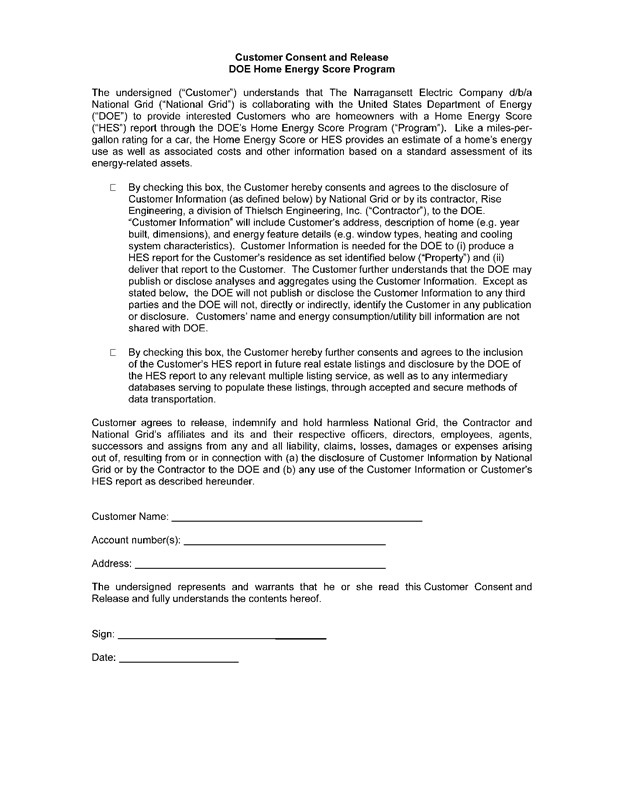Overview
Home energy labels are increasingly becoming a facet of real estate transactions. Given this, there are often concerns about whether the information contained on home energy labels are protected as private information under law, and whether documented consent from a homeowner is required to provide this information to a Multiple Listing Service (MLS) database or similar real estate listing location that is then made available to the public.
Jump to:
Asset Ratings
Utility Program Considerations
MLS Considerations
Consumer Consent
Example Authorization Form
Because residential energy labels address the home as an asset and do not focus on a homeowner’s specific energy consumption patterns, the homeowner’s behavioral characteristics, or the homeowner’s personally identifiable information, federal and state laws do not appear to protect the energy label information from public disclosure or publication. Therefore, there appears to be no legal basis for a homeowner to challenge the uploading of the information contained on a home energy label to an MLS site or real estate search engine sites such as Realtor.com and Zillow.
Nonetheless, several home energy labeling programs have taken steps to legally document that they have the right and ability to convey home energy label data to a real estate database like an MLS, as well as to publicly confirm to their constituents/customers their intent to make the residential energy rating information available for use in the marketplace.
Learn More about asset ratings
Energy efficiency programs administered by a utility or a public benefits organization on behalf of utilities, are particularly sensitive to any customer information being shared publicly. An energy efficiency program may interact specifically with energy rating information originating from their program, as a partner to an originating organization (e.g. a Home Energy Score partner), or with an existing energy rating that is integrated into a program (e.g. the HERS Index used in an above-code new homes program). In each of these cases, the energy efficiency program may have a different relationship with the energy rating. In one case, the energy efficiency program is an “originator” of the energy rating and may claim it’s public use. In other cases, the energy efficiency program may be participating in a third party’s rating system. In any case, best practice would be to ensure that all contractual agreements between the energy efficiency program and customers (whether home builders or homeowners) include a clause noting the public nature of the residential energy rating generated through the program. This is done primarily to ensure any potential legal uncertainties or ambiguities are removed.
MLSs will generally turn to their contractual relationship with the data provider to ensure that information they are receiving is accurately compiled and not protected through some other privacy agreement or provision. An MLS typically does not own any of the data or information uploaded onto its platform. MLSs generally rely on licensed real estate professionals to voluntarily upload the information and assumes that the entity providing the data has determined that the data can be lawfully uploaded and made public. In the case of a licensed real estate professional providing the information, they are given the right to share information by the homeowners via their binding listing agreement. In the case of a public or private entity who provides data to the MLS, a contract between that entity and the MLS specifies what data can be received by the MLS and how the MLS can utilize the data on their listing service.
While MLSs are very concerned with the accuracy of information they receive and possible liability for any inaccurate information conveyed through their database, they have expressed comfort with receiving verified residential energy rating information that comes directly from an originating source. To ease the technical and administrative challenges of dealing with multiple sources of energy ratings, this information can also be provided to the MLS via an ‘aggregating’ service that conveys multiple data types from various verified originating programs.
Developing a system of securing owner consent to share or post a home energy rating before doing so is in-line with best practice. Such a consent process, while not legally required, establishes expectations with the customer, minimizes potential conflict, and alleviates any potential concerns a data aggregator or MLS listing service would have with including such information in their database. It can also remove concerns amongst real estate professionals about their potential legal exposure when disclosing home energy information that could impact the sale or purchase process.
In general, opt-out or opt-in strategies can be employed. However, opt-out is likely to result in larger participation rates while opt-in is often viewed as the more conservative approach.
Below is an example authorization form that National Grid in Rhode Island used for their pilot deployment of Home Energy Scores through home energy assessments.
